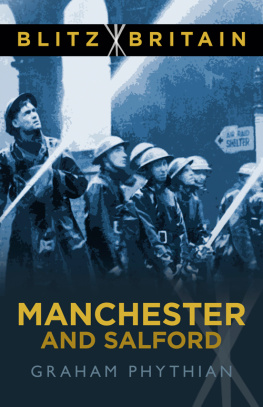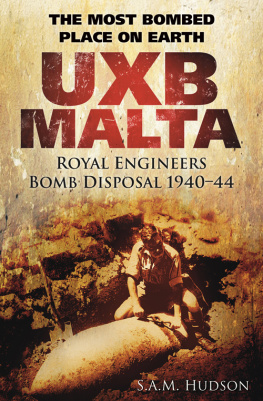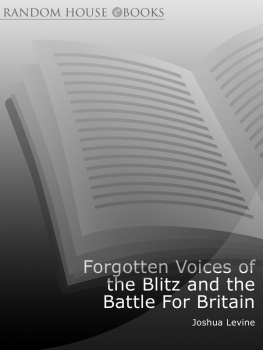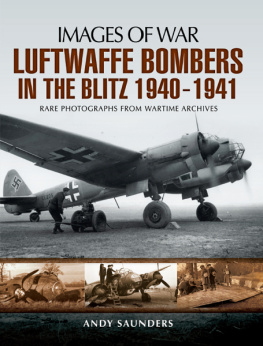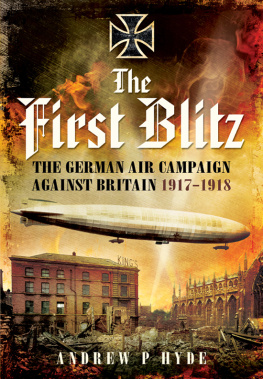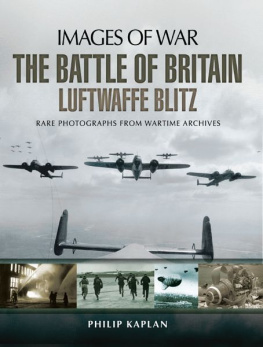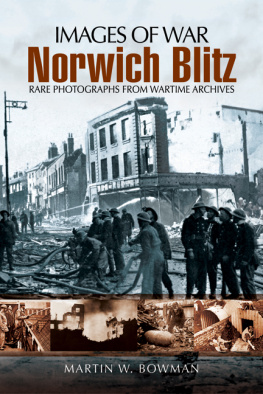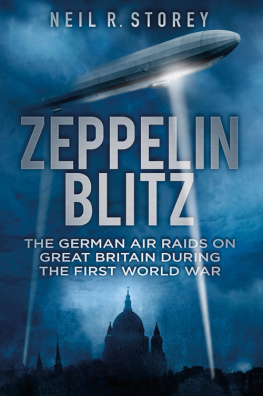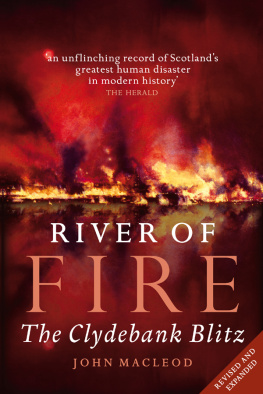
My thanks go to the following:
Duncan Broady and the staff of Greater Manchester Police Museum and Archives, for access to wartime documents and loan of photographs.
Bob Bonner and the staff of Greater Manchester Fire Service Museum, for information on Salford, access to documents, and loan of photographs.
Andrew Schofield and the staff of the North West Sound Archive.
Dr Austin Elliott, for information on shelter legs.
Tracey Walker of the Manchester Art Gallery.
Peter Turner and the staff of Salford Local History Archives.
Michael Powell, Canon Andrew Shanks and the staff of Chethams Library.
Philip Lloyd for loan of ration books.
The staff of: Manchester Central Library Local History and Archives+, Trafford Archives and Local History, Stockport Local Heritage Library, Imperial War Museum North, Oldham Local History Archives, Salford Royal Hospital, Stockport Air-Raid Shelters Museum, Manchester Southern Cemetery, and Agecroft and Weaste Cemeteries, Salford.
John Clarke MBE KZ, Peter Dawson, Alan Eachus, Annie Gibb, Jerry Hartley, Francis Hogan, Jenny Johnson, David McCarthy, Elizabeth McNulty, Ian Meadowcroft, Alan Morrison, John Nuralli, Eve ONeill, Sandra Parker, William Paul, Olive Turnbull, Peter Wood, Constance Wright, and the late Dennis Humphries, for personal reminiscences.
and of course to the team at The History Press.
Finally, every reasonable attempt has been made to trace the copyright owners of visual material used in this book. Any oversights or omissions should be communicated in writing to the author, c/o The History Press.
CONTENTS
It has been said by wiser heads than mine that there is no such thing as a definitive history of anything. Herein lies the fascination: new details come to light, the accepted facts may be questioned, and there is always scope for fresh interpretation of what are currently the official versions.
So this book does not claim to be the final word on the Manchester and Salford Blitz of the Second World War. Also, many readers already familiar with the stories will no doubt recognise a lot of the details, and I have to admit that there is not a great deal that is startlingly new here (with the possible exception of some of the photographs recently brought to light by the Greater Manchester Police and Fire Service Museums). However, the rationale of the book has been to gather together, geographically and thematically, all the various narrative strands, with the accent on personal memories and oral history. It is the synthesis which I believe is new. And there is therefore some minor overlap with my Manchester at War: The Peoples Story , which may profitably be read as a complement to this work.
The books, documents and websites I consulted are given in the bibliography. The only sources I give in the text are for straight quotations, either from literature or newspapers, or from the direct speech of tape transcripts. Where no source for direct speech is given in the text, these are extracts from my own interviews or communications with the people involved.
In general I have based the narrative on primary sources, among which I would naturally include the testimony of the many contributors to the excellent Neil Richardson local history series. Where the primary sources have run dry or proven difficult to track down, I owe a sizeable debt of thanks to the work of Clive Hardy, Robert Nicholls, Stuart Hylton, Keith Warrender, Richard Overy, and Peter J.C. Smith (see bibliography).
A possible problem with wartime reporting is the existence of censorship. For reasons of security or morale, newspaper reports often give a vague, diluted or highly selective version of the facts. In war, the first casualty is the truth, may be a clich, but the more sophisticated the media, the more accurate an observation it seems to be. I have used contemporary newspaper reports as a source, but wherever possible I have cross-checked the details from official documents, a list of which I give in the bibliography and appendices.
I have indulged in a couple of instances of informed guesswork. For example, I have placed the falling of the high-explosive bomb on the grassy embankment described by Ken Harrop in Chapter Four at the railway end of Trentham Street in Hulme. This is because the location detail given in Manchester Wartime Memories is such an embankment on the TraffordManchester border. Having had a good look round the nearby streets, and having consulted a contemporary map, I came to the conclusion that the Trentham Street railway embankment was the only possible place for the bomb to have fallen. I welcome corrections, if appropriate.
The same goes for my opting for Mark Addys bridge across the Irwell/Ship Canal as being the one crossed by Dr Garfield Williams on 23 December 1940 as he made his way across the blitzed city from Salford to Whalley Range. This footbridge was used later the same day by a family going in the opposite direction, from Sale to their home in Ordsall, so it seems fairly certain its the same one, as by all accounts other major bridges were blocked.
I have included the well-known anecdote about George Hall receiving a custodial sentence for snoring in a public air-raid shelter, but I was unable to find a primary source for this. I would appreciate any enlightenment on the matter.
Dr Garfield Williamss words in Chapter One are from his article in Our Blitz: Red Sky Over Manchester (pp. 44-48). The quotations from John Clarke in Chapters Three and Five are from my recorded interview with him in August 2014. The Lord Haw-Haw extracts given in Chapters Three and Seven are taken from my communications with people who recall the original broadcasts, and from oral recordings in the North West Sound Archive and the Salford Life Times archives. A full list of contributors is given in the acknowledgements.

Parker Street and Portland Street warehouses from Piccadilly Bus Station, 23 December 1940. (Greater Manchester Police Museum and Archives)
The word blitz, of course, derives from the German blitzkrieg , or lightning war, which is an apt description of the rapid Nazi conquest of Poland, France and the Low Countries in the early months of the Second World War. As the pedants have pointed out, blitz is therefore, strictly speaking, something of a misnomer when applied to the prolonged Luftwaffe attacks on British cities. No matter: the word has entered English usage, and now has a universally accepted meaning. Well, almost: The Manchester Blitz may refer specifically to the raids of the two nights of 2223 December 1940, or it may be used as a more general term, covering all the bombing attacks throughout the two years, even including Trafford Park, Salford and Stretford. This books main emphasis is on the so-called Christmas Blitz in these areas, but also includes detailed references to raids that took place at other times.
For readers unsure of the precise geographical demarcations: Salford is a city in its own right, quite distinct from Manchester; Trafford Park and Stretford are both areas within the Metropolitan Borough of Trafford, which is again separate from Manchester. Oldham, Bury and Stockport are also separate boroughs.
To clarify the location of Salford Royal Infirmary: the original SRI, the one that was bombed in 194041, was on Chapel Street. The exterior of the building has been restored, and there are flats on the site now. Hope Hospital on Stott Lane, also hit during the war, is now the site of the present-day Salford Royal, substantially rebuilt since 2007.
Next page
